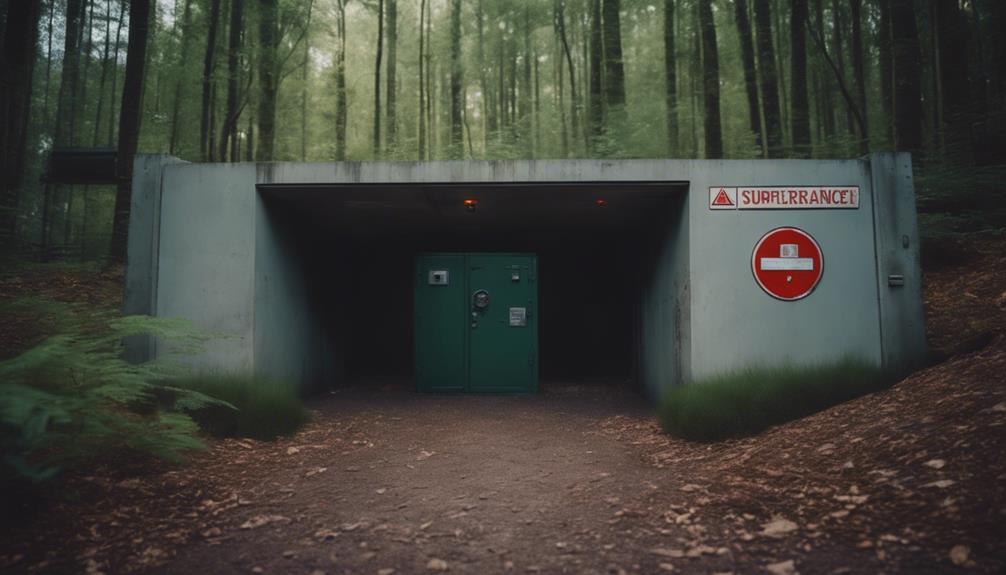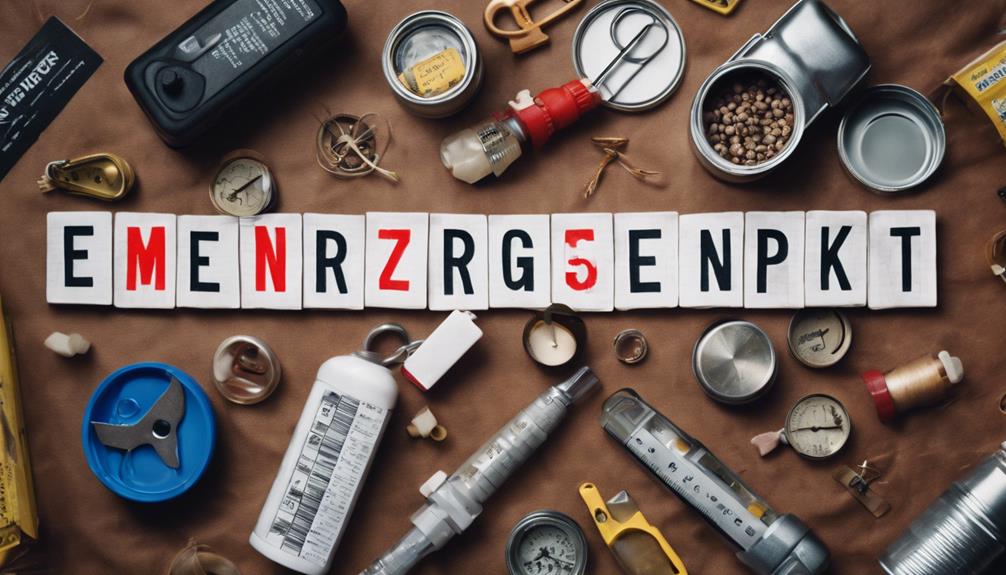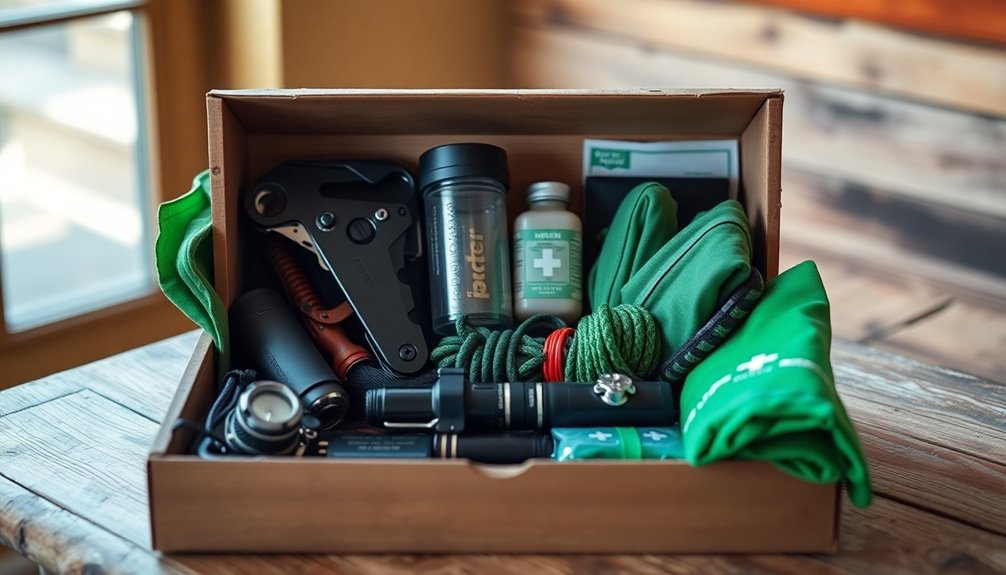Prepare for the worst with crucial strategies in doom prepping. Master first aid, fire starting, navigation, shelter building, and self-defense skills. Stockpile non-perishable food, water, medical kits, and tools. Utilize water purification methods like boiling, filtration, and distillation. Establish a strong community with survival plans and effective communication channels. Planning ahead for disruptions is key to survival. Further tips await for enhancing your preparedness.
Key Takeaways
- Identify potential threats and vulnerabilities in your area.
- Stockpile essential supplies like food, water, and medical kits.
- Develop skills in first aid, fire starting, and self-defense.
- Build a sustainable stockpile focusing on non-perishable items.
- Establish a strong community with effective communication and defense strategies.
The Importance of Doom Prepping
Preparing for extreme worst-case scenarios is essential for your survival and security in today's uncertain world. Being a doomsday prepper involves more than just stockpiling supplies; it's about readiness for potential disasters like societal collapse and widespread chaos. Recent world events have underscored the importance of doom prepping, pushing many individuals and communities to take proactive measures. Inside the world of preppers, skills such as self-defense, sustainable food production, and first-aid training are just as critical as having a well-stocked pantry. Preppers focus on developing resilience and adaptability to survive long-term in a variety of catastrophic situations. By building strong networks and sharing knowledge, many find solace within these communities, knowing they are better prepared to handle whatever may come.
Doom prepping requires extensive planning, including the identification of potential threats and vulnerabilities. Stockpiling essential supplies such as food, water, medical kits, and tools is vital for sustaining yourself in challenging times.
Additionally, acquiring survival skills like first aid, self-defense, and basic bushcraft can further enhance your readiness for unexpected situations.
Essential Skills for Survival

To survive in challenging scenarios, mastering essential survival skills such as first aid, fire starting, navigation, shelter building, and self-defense is critical. Here are the key skills you should focus on developing:
| Skill | Description | Importance |
|---|---|---|
| First Aid | Learn to treat injuries and illnesses in emergencies using basic medical knowledge and supplies. | Essential for addressing health issues promptly. |
| Fire Starting | Master various techniques like friction, flint, or magnifying glass to create fire for warmth and cooking. | Necessary for staying warm and preparing food. |
| Navigation | Develop skills in using maps, compasses, and GPS devices to find your way in unfamiliar or hostile terrains. | Critical for avoiding getting lost and reaching safety. |
| Shelter Building | Practice constructing shelters using natural materials or emergency structures to protect from the elements. | Important for staying safe and comfortable. |
| Self-Defense | Acquire skills for personal protection and safety in threatening situations to defend yourself if needed. | Essential for ensuring personal safety. |
Building a Sustainable Stockpile

Consider strategically building a sustainable stockpile of essential supplies to enhance your preparedness for potential emergencies. When creating your stockpile, focus on non-perishable food items such as canned goods, rice, and pasta that have a long shelf life.
Don't forget to include important supplies like water purification tablets, first aid kits, and hygiene products to cover basic needs. It's essential to rotate your stockpile regularly to maintain freshness and prevent items from expiring.
When planning your stockpile, take into account any dietary restrictions or preferences within your household. Calculate the quantity of supplies needed based on the number of people in your family and the potential duration of emergency situations you're preparing for.
Water Purification Methods

When facing potential emergencies, ensuring access to clean drinking water is essential for your survival, especially during natural disasters.
Boiling water is a simple and effective method to purify it by killing harmful bacteria and parasites that could make you sick.
Chemical water treatment tablets are another handy option, releasing chlorine or iodine to disinfect water quickly.
If you have access to filtration systems like water filters or purifiers, use them to remove contaminants and particles from water, providing you with safe drinking water.
UV water purifiers are also valuable tools, using ultraviolet light to eliminate harmful bacteria, viruses, and protozoa from water sources.
Finally, distillation is a more complex but reliable method, involving boiling water, collecting the steam, and then condensing it back into liquid form to remove impurities effectively.
Having a good understanding of these water purification methods will help you stay hydrated and healthy in challenging situations.
Community Establishment Strategies

When preparing for catastrophic events, establishing a strong community is crucial. This involves creating group survival plans and addressing defense and security measures.
Assigning roles and fostering effective communication within the community are essential for cohesive and successful long-term survival strategies.
Group Survival Plans
Establishing a robust community is essential for ensuring long-term survival in doomsday scenarios. Group survival plans play a pivotal role in this by assigning specific roles to individuals within the community. These roles help in efficiently allocating resources and responsibilities, ensuring that everyone has a part to play in the collective survival.
Effective communication channels are equally important in group survival plans. They facilitate coordination, decision-making, and the dissemination of critical information during crises. To tackle challenges successfully, maintaining calmness and unity among group members is paramount. By working together cohesively, communities can build resilience and increase their chances of rebuilding post-catastrophe.
Defense and Security
To guarantee the safety and protection of your community in survival scenarios, implementing robust defense and security strategies is essential.
Establishing a community is important for defense and security. Assigning specific roles and responsibilities within the community ensures effective defense strategies.
Developing communication protocols and security measures is critical for protection. Building alliances with neighboring communities can enhance overall defense capabilities.
Training members in self-defense and basic security measures strengthens the community's resilience against threats. By creating a structured defense plan, your community can better prepare for potential dangers and emergencies.
It's essential to establish clear protocols for handling security breaches and communicating threats. Regular drills and exercises can help members become familiar with defense procedures.
Planning Ahead for Disruptions

Prepare yourself by creating a detailed plan for handling potential disruptions effectively. Being prepared for unforeseen circumstances is essential for survival. Doomsday preppers understand the importance of planning ahead and being self-sufficient when resources are scarce. Here is a simple guide to help you prepare for disruptions:
| Step | Action |
|---|---|
| Assess Resources | Evaluate available supplies and identify areas for improvement. |
| Stockpile Essentials | Gather food, water, medical supplies, and other necessities. |
| Develop Survival Plan | Create a strategy for long-term survival during chaotic times. |
Frequently Asked Questions
How Do I Prepare Myself for Doomsday?
Prepare yourself for doomsday by stockpiling supplies, learning survival skills, creating an emergency plan, investing in alternative power sources, and staying informed. Continuously assess and update your preparedness plans to adapt to changing circumstances.
Should I Start Preparing for Doomsday?
You should start preparing for doomsday by considering potential risks and creating a plan. Stock up on essentials, learn survival skills, and develop emergency strategies. Being prepared can offer peace of mind and readiness for unexpected events.
What Is the Psychology of Doomsday Preppers?
In the mindset of doomsday preppers, the psychology reflects a mix of fear, control, and readiness. You'll find anxiety, paranoia, and a drive for self-sufficiency. Through preparation, they seek empowerment and a sense of security.
How Do You Prepare Food for Doomsday?
To prepare food for doomsday, start by canning, farming for sustenance, and raising chickens for a continuous supply of eggs and meat. Guarantee safe drinking water with efficient purification methods and establish a clear chain of command for emergencies.
Conclusion
To sum up, being prepared for the worst can make all the difference in a crisis.
Remember, the early bird catches the worm, so start prepping today to make sure you and your loved ones are ready for any disaster that may come your way.
Stay informed, stay proactive, and most importantly, stay safe.
Good luck, and may your preparations keep you secure in times of uncertainty.










